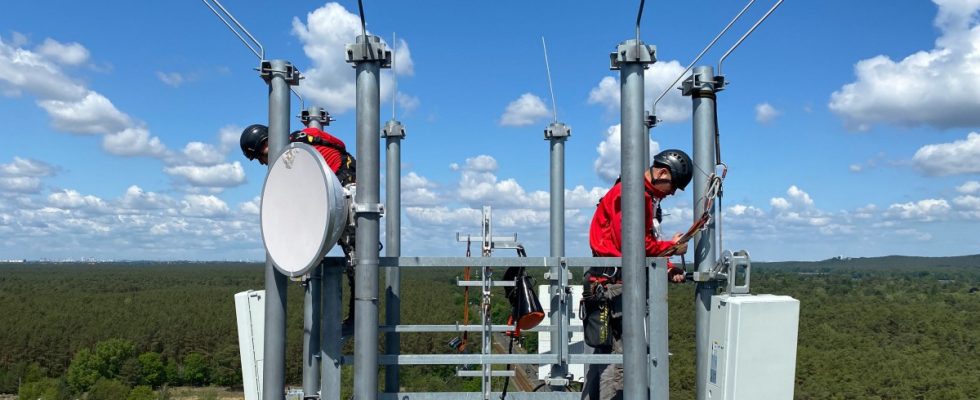Let’s assume that a large industrial country in the middle of Europe wanted to create a comprehensive network for a future technology like 5G. And let’s assume that the three mobile network operators in this country wanted to rely on technology from companies that come from a state that can exercise absolute control over their companies if necessary. A state that makes a central part of the digital infrastructure of this European industrial state dependent on itself. Smart idea?
If only it were just a mind game – that’s probably what some in the German security authorities would like.
For years, the Office for the Protection of the Constitution has warned that exactly this scenario would occur in Germany. Vain. Almost 100 percent of the German population is already covered by the new 5G mobile communications standard, including Chinese technology from Huawei and ZTE. It was only last autumn that Nancy Faeser’s (SPD) Federal Ministry of the Interior decided to ban the components of these Chinese companies, but nothing has happened so far because the FDP considers this measure too strict.
It’s about attempts by foreign powers to weaken the Federal Republic
Such a security policy fiasco should not be repeated. This is also why Faeser’s State Secretary Rita Schwarzelühr-Sutter came to the Bundeswehr University in Neubiberg on the eve of the Munich Security Conference to speak to security officers from German companies and representatives of the security authorities. She wants here Key points of a new “National Economic Protection Strategy” introduce.
“Economic protection is a central issue of internal security,” says Schwarzelühr-Sutter. Because it’s not just about the well-being of individual companies or about industrial espionage. It’s about something bigger: foreign powers that are systematically trying to weaken the Federal Republic. At stake is the prosperity and stability of the entire republic.
“Germany is a high-value target,” says Maik Pawlowsky from the cyber and counterintelligence department of the Federal Office for the Protection of the Constitution on stage at the Bundeswehr University. And first and foremost mentions foreign intelligence services as a threat. China and Russia are certainly the most committed countries in this field, but not the only ones. Economic protection means protection against espionage, sabotage and blackmail. But it also means reducing dependencies on geopolitically difficult partners.
The companies themselves would also have to provide money and staff
So far, the initiatives to really advance the issue have been half-hearted or, if serious, too uncoordinated. To better protect the critical infrastructure, a law with new requirements for pipeline operators, for example, will soon be introduced. The “economic protection strategy” should now address the German economy as a whole. And the Interior Ministry wants to keep an overview.
In the future, government and business should be able to exchange information about current threats and risks via a digital platform. Such a platform is currently being set up with a focus on cybersecurity and will be expanded to include other areas of corporate security. To this end, the overall information and alert chains should be improved, and business and authorities should also come together to develop scenarios for future threats.
A lot of the paper sounds more like mediation work for the Ministry of the Interior, and that’s basically what it is. “The state can create structures,” says Carlo Masala, Professor of International Politics here at the Bundeswehr University, “but if companies and all employees are not prepared to do something to ensure their resilience, then it will not work.” Companies would therefore have to provide money and staff to become safer. Because they are ultimately responsible for it.
The sensitivity to safety concerns could also be greater at traffic lights
Julia Vincke, who is responsible for corporate security at BASF, does not contradict this. She just says that sometimes it’s difficult to get through to board members that it’s not just about occupational safety, but also about protection against attacks from outside.
The Federal Office for the Protection of the Constitution, Pawlowsky, had previously given examples of how tricky the attackers were. For example, by infiltrating intelligence officers into companies or recruiting employees who then divert business secrets. Or by agents disguised as headhunters convincing employees to open files contaminated with spyware on company computers.
On the other hand, the really big system questions – keyword 5G – remained in the background on Thursday evening. The Ministry of the Interior is still hopeful that sensitivity to security issues will increase not only in the economy, but also in its own coalition.
With the FDP regarding mobile communications, and on another matter also with the Chancellor: Olaf Scholz allowed the Chinese state-owned company Cosco to participate in a container terminal in the port of Hamburg nine months ago, against all advice from the other departments and the security authorities.

